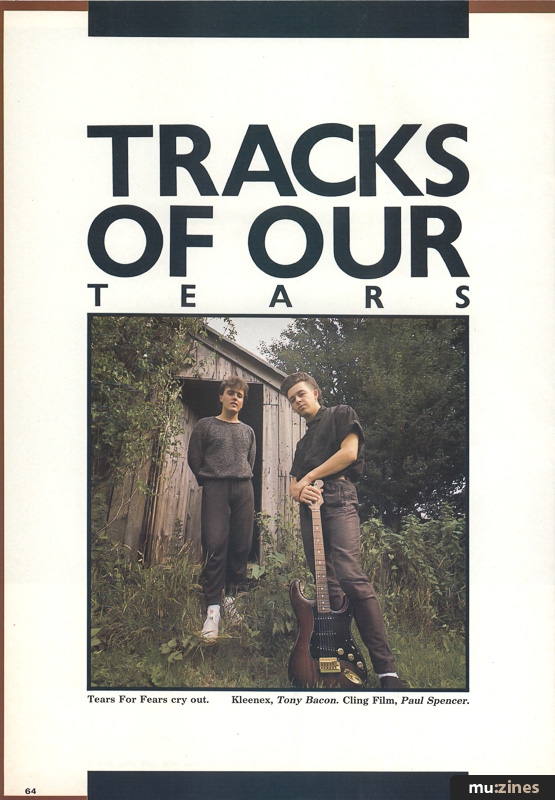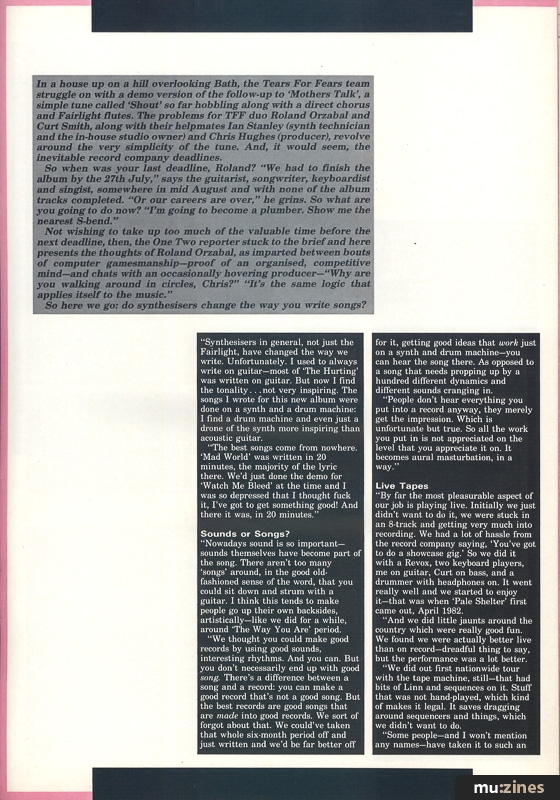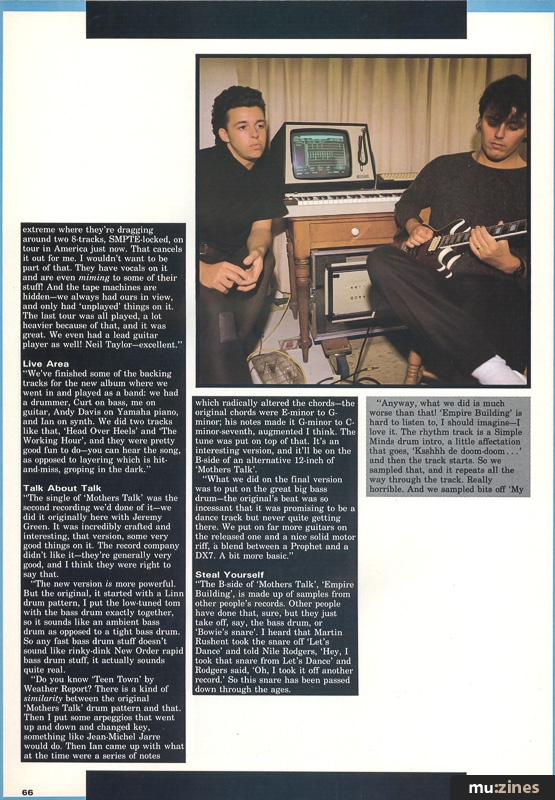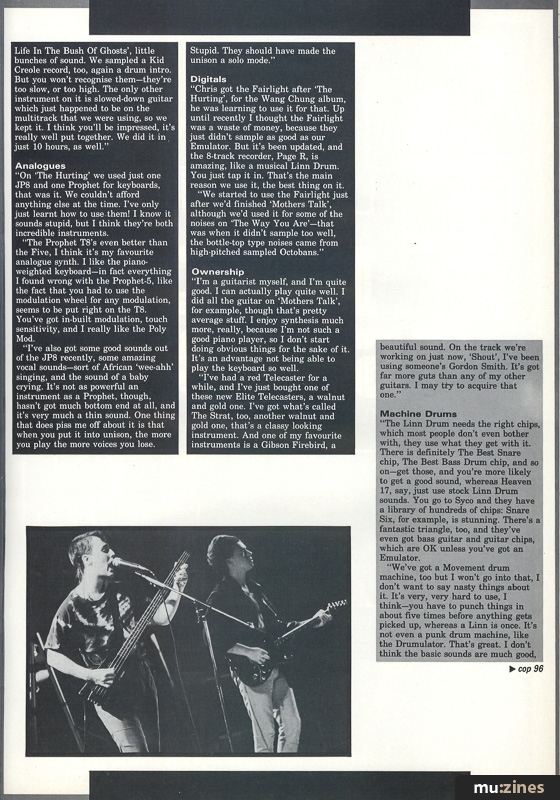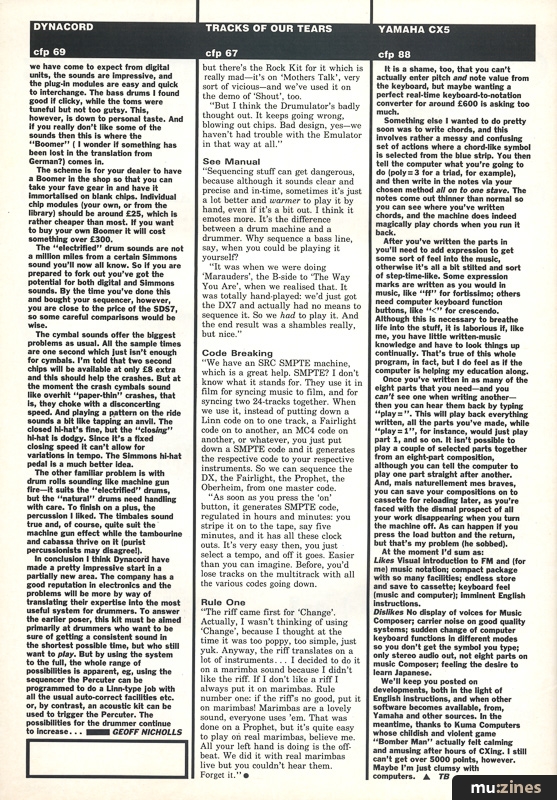Magazine Archive
Home -> Magazines -> Issues -> Articles in this issue -> View
Tracks Of Our Tears | |
Tears for FearsArticle from One Two Testing, October 1984 | |
Roland Orzabal picks over the Tears' gear
Tears For Fears cry out. Kleenex, Tony Bacon. Cling Film, Paul Spencer.
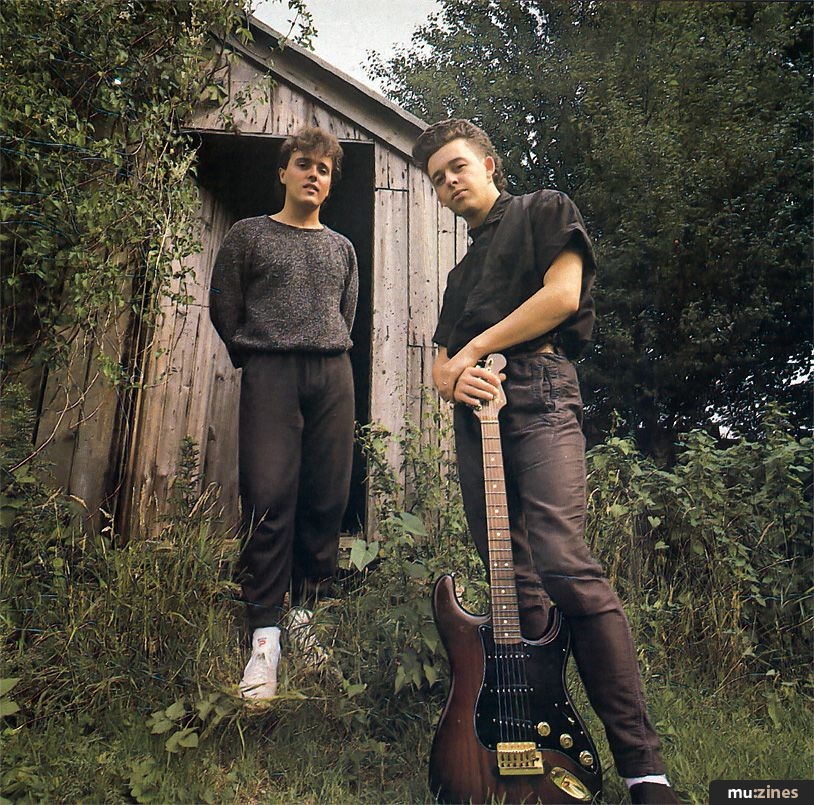
Image credit: Paul Spencer
In a house up on a hill overlooking Bath, the Tears For Fears team struggle on with a demo version of the follow-up to 'Mothers Talk', a simple tune called 'Shout' so far hobbling along with a direct chorus and Fairlight flutes. The problems for TFF duo Roland Orzabal and Curt Smith, along with their helpmates Ian Stanley (synth technician and the in-house studio owner) and Chris Hughes (producer), revolve around the very simplicity of the tune. And, it would seem, the inevitable record company deadlines.
So when was your last deadline, Roland? "We had to finish the album by the 27th July," says the guitarist, songwriter, keyboardist and singist, somewhere in mid August and with none of the album tracks completed. "Or our careers are over," he grins. So what are you going to do now? "I'm going to become a plumber. Show me the nearest S-bend."
Not wishing to take up too much of the valuable time before the next deadline, then, the One Two reporter stuck to the brief and here presents the thoughts of Roland Orzabal, as imparted between bouts of computer gamesmanship — proof of an organised, competitive mind — and chats with an occasionally hovering producer — "Why are you walking around in circles, Chris?" "It's the same logic that applies itself to the music."
So here we go: do synthesisers change the way you write songs?
"Synthesisers in general, not just the Fairlight, have changed the way we write. Unfortunately. I used to always write on guitar — most of 'The Hurting' was written on guitar. But now I find the tonality... not very inspiring. The songs I wrote for this new album were done on a synth and a drum machine: I find a drum machine and even just a drone of the synth more inspiring than acoustic guitar.
"The best songs come from nowhere. 'Mad World' was written in 20 minutes, the majority of the lyric there. We'd just done the demo for 'Watch Me Bleed' at the time and I was so depressed that I thought fuck it, I've got to get something good! And there it was, in 20 minutes."
Sounds or Songs?
"Nowadays sound is so important — sounds themselves have become part of the song. There aren't too many 'songs' around, in the good old-fashioned sense of the word, that you could sit down and strum with a guitar. I think this tends to make people go up their own backsides, artistically — like we did for a while, around 'The Way You Are' period.
"We thought you could make good records by using good sounds, interesting rhythms. And you can. But you don't necessarily end up with a good song. There's a difference between a song and a record: you can make a good record that's not a good song. But the best records are good songs that are made into good records. We sort of forgot about that. We could've taken that whole six-month period off and just written and we'd be far better off for it, getting good ideas that work just on a synth and drum machine — you can hear the song there. As opposed to a song that needs propping up by a hundred different dynamics and different sounds cranging in.
"People don't hear everything you put into a record anyway, they merely get the impression. Which is unfortunate but true. So all the work you put in is not appreciated on the level that you appreciate it on. It becomes aural masturbation, in a way."
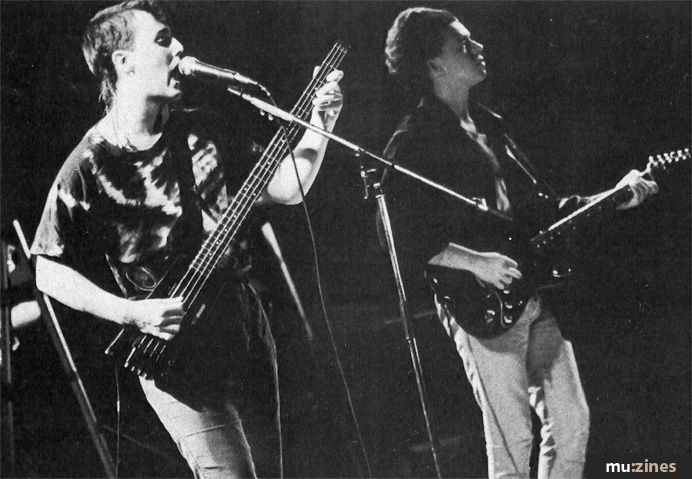
Image credit: Paul Spencer
Live Tapes
"By far the most pleasurable aspect of our job is playing live. Initially we just didn't want to do it, we were stuck in an 8-track and getting very much into recording. We had a lot of hassle from the record company saying, 'You've got to do a showcase gig.' So we did it with a Revox, two keyboard players, me on guitar, Curt on bass, and a drummer with headphones on. It went really well and we started to enjoy it — that was when 'Pale Shelter' first came out, April 1982.
"And we did little jaunts around the country which were really good fun. We found we were actually better live than on record — dreadful thing to say, but the performance was a lot better.
"We did out first nationwide tour with the tape machine, still — that had bits of Linn and sequences on it. Stuff that was not hand-played, which kind of makes it legal. It saves dragging around sequencers and things, which we didn't want to do.
"Some people — and I won't mention any names — have taken it to such an extreme where they're dragging around two 8-tracks, SMPTE-locked, on tour in America just now. That cancels it out for me. I wouldn't want to be part of that. They have vocals on it and are even miming to some of their stuff! And the tape machines are hidden — we always had ours in view, and only had 'unplayed' things on it. The last tour was all played, a lot heavier because of that, and it was great. We even had a lead guitar player as well! Neil Taylor — excellent."
Live Area
"We've finished some of the backing tracks for the new album where we went in and played as a band: we had a drummer, Curt on bass, me on guitar, Andy Davis on Yamaha piano, and Ian on synth. We did two tracks like that, 'Head Over Heels' and 'The Working Hour', and they were pretty good fun to do — you can hear the song, as opposed to layering which is hit-and-miss, groping in the dark."
Talk About Talk
"The single of 'Mothers Talk' was the second recording we'd done of it — we did it originally here with Jeremy Green. It was incredibly crafted and interesting, that version, some very good things on it. The record company didn't like it — they're generally very good, and I think they were right to say that.
"The new version is more powerful. But the original, it started with a Linn drum pattern, I put the low-tuned tom with the bass drum exactly together, so it sounds like an ambient bass drum as opposed to a tight bass drum. So any fast bass drum stuff doesn't sound like rinky-dink New Order rapid bass drum stuff, it actually sounds quite real.
"Do you know 'Teen Town' by Weather Report? There is a kind of similarity between the original 'Mothers Talk' drum pattern and that. Then I put some arpeggios that went up and down and changed key, something like Jean-Michel Jarre would do. Then Ian came up with what at the time were a series of notes which radically altered the chords — the original chords were E-minor to G-minor; his notes made it G-minor to C-minor-seventh, augmented I think. The tune was put on top of that. It's an interesting version, and it'll be on the B-side of an alternative 12-inch of 'Mothers Talk'.
"What we did on the final version was to put on the great big bass drum — the original's beat was so incessant that it was promising to be a dance track but never quite getting there. We put on far more guitars on the released one and a nice solid motor riff, a blend between a Prophet and a DX7. A bit more basic."
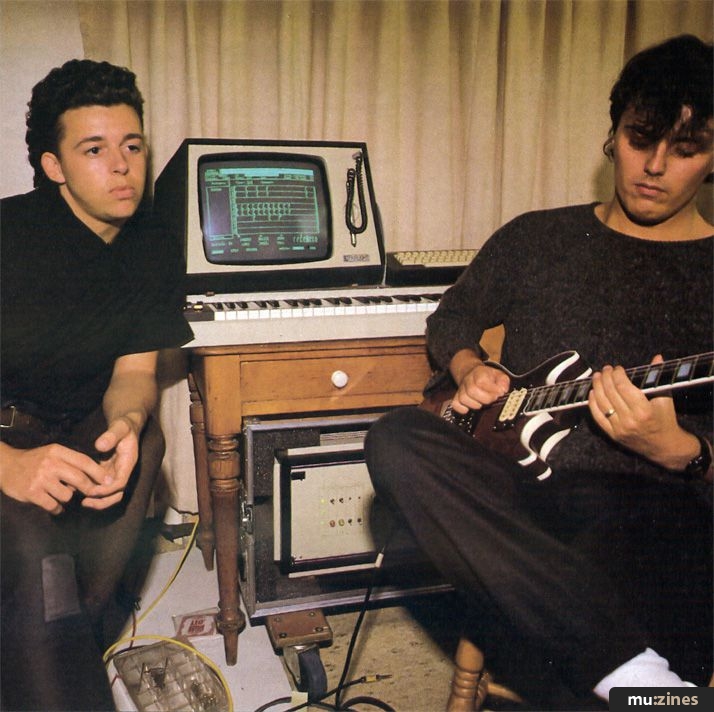
Image credit: Paul Spencer
Steal Yourself
"The B-side of 'Mothers Talk', 'Empire Building', is made up of samples from other people's records. Other people have done that, sure, but they just take off, say, the bass drum, or 'Bowie's snare'. I heard that Martin Rushent took the snare off 'Let's Dance' and told Nile Rodgers, 'Hey, I took that snare from Let's Dance' and Rodgers said, 'Oh, I took it off another record.' So this snare has been passed down through the ages.
"Anyway, what we did is much worse than that! 'Empire Building' is hard to listen to, I should imagine — I love it. The rhythm track is a Simple Minds drum intro, a little affectation that goes, 'Ksshhh de doom-doom...' and then the track starts. So we sampled that, and it repeats all the way through the track. Really horrible. And we sampled bits off 'My Life In The Bush Of Ghosts', little bunches of sound. We sampled a Kid Creole record, too, again a drum intro. But you won't recognise them — they're too slow, or too high. The only other instrument on it is slowed-down guitar which just happened to be on the multitrack that we were using, so we kept it. I think you'll be impressed, it's really well put together. We did it in just 10 hours, as well."
Analogues
"On 'The Hurting' we used just one JP8 and one Prophet for keyboards, that was it. We couldn't afford anything else at the time. I've only just learnt how to use them! I know it sounds stupid, but I think they're both incredible instruments.
"The Prophet T8's even better than the Five, I think it's my favourite analogue synth. I like the piano-weighted keyboard — in fact everything I found wrong with the Prophet-5, like the fact that you had to use the modulation wheel for any modulation, seems to be put right on the T8. You've got in-built modulation, touch sensitivity, and I really like the Poly Mod.
"I've also got some good sounds out of the JP8 recently, some amazing vocal sounds — sort of African 'wee-ahh' singing, and the sound of a baby crying. It's not as powerful an instrument as a Prophet, though, hasn't got much bottom end at all, and it's very much a thin sound. One thing that does piss me off about it is that when you put it into unison, the more you play the more voices you lose. Stupid. They should have made the unison a solo mode."
Digitals
"Chris got the Fairlight after 'The Hurting', for the Wang Chung album, he was learning to use it for that. Up until recently I thought the Fairlight was a waste of money, because they just didn't sample as good as our Emulator. But it's been updated, and the 8-track recorder, Page R, is amazing, like a musical Linn Drum. You just tap it in. That's the main reason we use it, the best thing on it.
"We started to use the Fairlight just after we'd finished 'Mothers Talk', although we'd used it for some of the noises on 'The Way You Are' — that was when it didn't sample too well, the bottle-top type noises came from high-pitched sampled Octobans."
Ownership
"I'm a guitarist myself, and I'm quite good. I can actually play quite well. I did all the guitar on 'Mothers Talk', for example, though that's pretty average stuff. I enjoy synthesis much more, really, because I'm not such a good piano player, so I don't start doing obvious things for the sake of it. It's an advantage not being able to play the keyboard so well.
"I've had a red Telecaster for a while, and I've just bought one of these new Elite Telecasters, a walnut and gold one. I've got what's called The Strat, too, another walnut and gold one, that's a classy looking instrument. And one of my favourite instruments is a Gibson Firebird, a beautiful sound. On the track we're working on just now, 'Shout', I've been using someone's Gordon Smith. It's got far more guts than any of my other guitars. I may try to acquire that one."
Machine Drums
"The Linn Drum needs the right chips, which most people don't even bother with, they use what they get with it. There is definitely The Best Snare chip, The Best Bass Drum chip, and so on — get those, and you're more likely to get a good sound, whereas Heaven 17, say, just use stock Linn Drum sounds. You go to Syco and they have a library of hundreds of chips: Snare Six, for example, is stunning. There's a fantastic triangle, too, and they've even got bass guitar and guitar chips, which are OK unless you've got an Emulator.
"We've got a Movement drum machine, too but I won't go into that, I don't want to say nasty things about it. It's very, very hard to use, I think — you have to punch things in about five times before anything gets picked up, whereas a Linn is once. It's not even a punk drum machine, like the Drumulator. That's great. I don't think the basic sounds are much good, but there's the Rock Kit for it which is really mad — it's on 'Mothers Talk', very sort of vicious — and we've used it on the demo of 'Shout', too.
"But I think the Drumulator's badly thought out. It keeps going wrong, blowing out chips. Bad design, yes — we haven't had trouble with the Emulator in that way at all."
See Manual
"Sequencing stuff can get dangerous, because although it sounds clear and precise and in-time, sometimes it's just a lot better and warmer to play it by hand, even if it's a bit out. I think it emotes more. It's the difference between a drum machine and a drummer. Why sequence a bass line, say, when you could be playing it yourself?
"It was when we were doing 'Marauders', the B-side to 'The Way You Are', when we realised that. It was totally hand-played: we'd just got the DX7 and actually had no means to sequence it. So we had to play it. And the end result was a shambles really, but nice."
Code Breaking
"We have an SRC SMPTE machine, which is a great help. SMPTE? I don't know what it stands for. They use it in film for syncing music to film, and for syncing two 24-tracks together. When we use it, instead of putting down a Linn code on to one track, a Fairlight code on to another, an MC4 code on another, or whatever, you just put down a SMPTE code and it generates the respective code to your respective instruments. So we can sequence the DX, the Fairlight, the Prophet, the Oberheim, from one master code.
"As soon as you press the 'on' button, it generates SMPTE code, regulated in hours and minutes: you stripe it on to the tape, say five minutes, and it has all these clock outs. It's very easy then, you just select a tempo, and off it goes. Easier than you can imagine. Before, you'd lose tracks on the multitrack with all the various codes going down.
Rule One
"The riff came first for 'Change'. Actually, I wasn't thinking of using 'Change', because I thought at the time it was too poppy, too simple, just yuk. Anyway, the riff translates on a lot of instruments... I decided to do it on a marimba sound because I didn't like the riff. If I don't like a riff I always put it on marimbas. Rule number one: if the riff's no good, put it on marimbas! Marimbas are a lovely sound, everyone uses 'em. That was done on a Prophet, but it's quite easy to play on real marimbas, believe me. All your left hand is doing is the offbeat. We did it with real marimbas live but you couldn't hear them. Forget it."
More with this artist
Roland Orzabal (Tears for Fears) |
The Tracks of our Tears (Tears for Fears) |
Tears For Fears (Tears for Fears) |
Publisher: One Two Testing - IPC Magazines Ltd, Northern & Shell Ltd.
The current copyright owner/s of this content may differ from the originally published copyright notice.
More details on copyright ownership...
Interview by Tony Bacon
Help Support The Things You Love
mu:zines is the result of thousands of hours of effort, and will require many thousands more going forward to reach our goals of getting all this content online.
If you value this resource, you can support this project - it really helps!
Donations for November 2025
Issues donated this month: 0
New issues that have been donated or scanned for us this month.
Funds donated this month: £0.00
All donations and support are gratefully appreciated - thank you.
Magazines Needed - Can You Help?
Do you have any of these magazine issues?
If so, and you can donate, lend or scan them to help complete our archive, please get in touch via the Contribute page - thanks!





